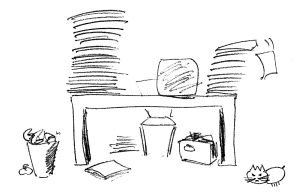It's quite possible that sometimes when you read an article on this website you have the feeling that you've seen it somewhere before. If so, there's a reason for that.
I'm slowly going through the original ICT in Education website and semi-republishing some articles on this new website.
Semi-republishing? Well, things change so rapidly in technology, and in education policy, that I don't want to just republish articles without evaluating their content. Some articles are of their time and would not warrant republishing. Others stand up to scrutiny but require a fresh coat of paint in the form of an update. Others may no longer be apposite, but having been conceived in a particular set of circumstances and at a particular time are of some historical or curiosity value.
All of which is why I haven't simply moved everything to the new website lock, stock and barrel.
If you're wondering why I am doing this at all, it's in order to give some of the more popular articles a new lease of life by exposing them to a new audience. One of the big problems with the original website, one of the main reasons for starting a new one from scratch, is that it's so hard to find anything. Even if I were to write an article pointing people towards some of the older ones it would soon be lost without trace.
Why not add a widget? I think I have already explained my reasons in one of the Wasteful Widgets articles.
It's been interesting to see how many times each semi-republished article has been read. In some cases, thousands of times in a couple of days. You'd think that an article several years old would have no life in it, but you could be wrong.
So what have I learnt from this?
Firstly, it is definitely worth revisiting older articles every so often and seeing if they need updating, need complete rewriting, or should just be left alone. Blogs and websites are not newspapers or magazines: you can change old articles with ease and impunity.
Secondly, it is much more useful, and much more of a service to readers I believe, to review old articles every so often than to simply point people towards them.
Thirdly, looking at articles from a few years ago (or sometimes even more recent than that is quite revealing of either issues going on at the time or one's attitudes towards them -- or both.
So, although you may have a feeling of déjà view occasionally when trawling through this site, rest assured that the previously-published articles have been reviewed for relevance and changed or added to where necessary.
Thus, even an article is exactly the same as it was originally, it has still been subject to scrutiny. (Presumably that means that, in some sense, the two articles -- the original and the new -- are not the same at all. I see no practical value of pursuing this line of thought, but if you have some time you may find it amusing to read 'Pierre Menard, Author of the Quixote', in the Fictions anthology of Borges' short stories (which is listed on my books page. In the story, Menard attempts to make up for the shortcomings of the original Don Quixote story:
"Menard did not want to copy the book; his goal was to write a few pages independently, which would coincide, "word for word, and line for line," with the original version by the author."
This is followed by a comparison of two extracts, one by Cervantes, the other by Menard; the extracts are identical.)
Coming back to the real world, it strikes me that a really interesting exercise would be to ask students to look at a story or an essay they wrote a year ago, and 'correct' it if necessary. Tools like wikis or the revision features in Office suites make this very easy to do without losing the original.
Being able to see, in a very visual way, what changes have been made could be very instrumental in getting a decent discussion going.
Just a thought.




